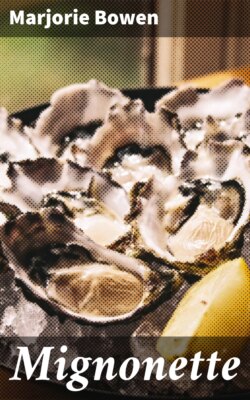Читать книгу Mignonette - Bowen Marjorie - Страница 10
На сайте Литреса книга снята с продажи.
§ 7
ОглавлениеTable of Contents
It was when Barbara returned from the excursion to Quarr Abbey that she found the letter from France. The maid gave it to her with others that had come during her absence. She saw the foreign stamp at once. "It must be from Aimée, I have no other acquaintances abroad."
How long ago was it? Ten days, a fortnight? She had forgotten. If she had not quite forgotten Aimée, at least she had put her from her thoughts, certainly she had never expected an answer to her hesitant, vague, embarrassed letter, sent on an impulse now completely vanished.
She even found it difficult now to understand why she had ever been interested in Madame Falconet and her daughter. She thought, They have nothing to do with me, they are provided for.
She tried to bring back that lost mood when Caroline Atwood had told her that she must leave, when the young company, the holiday air had oppressed her. I must have been lonely. And almost immediately afterward she had met Francis Shermandine.
Barbara was ashamed. But she had not, she assured herself, worked any mischief. She would never interfere again with the Falconets, no, nor either anyone else. She would answer civilly, she would send a sumptuous gift.
Before her dressing table she sat, gazing at the thin gray envelope, the fine handwriting that seemed to be traced in ink mixed with vinegar, the French stamp. She turned it over, and on the point of the flap was a small seal of pale green wax, stamped with a small flower and the letter M.
Not from Aimée, after all? But it must be.
She took off her hat and veil, the twilight was spreading in the room. They had had supper as well as luncheon near the ruins of Quarr Abbey. Nothing save formalities had passed, mostly in the presence of Harding and Sir Timothy's servant, but it had been a happiness and Barbara felt herself betrothed. Even her timid modesty did not doubt the meaning of this attention on the part of Francis Shermandine and Sir Timothy Boys. These agreeable, elegant, and kindly men were certainly going to ask her to be the wife of Francis Shermandine, the mistress of the gracious, ordered, polished life they shared.
She felt astounded by her brilliant luck, as if a star of heaven-sent flame had darted into her bosom to light and warm her existence that, by contrast with this magic glow, seemed dull as a heath at winter.
At first she had been startled to see the French letter, even slightly alarmed, as if some indiscretion had returned to her with painful consequences. But her new sense of security was too strong to be easily shaken, and the sight of the childish seal moved her to compassion.
The letter was in English, written correctly. As Barbara read she flushed, the blood coming quickly into her sun-warmed face.
Aimée had accepted the very tentative and now regretted advance from Barbara with enthusiasm. She wrote that this affection, sympathy, and friendship was deeply valued, that she had postponed her wedding until the autumn, and that she was coming to England to accept her sister's generous invitation. The problem of her mother she faced with ease. "Madame Falconet realizes that she will not be acceptable to you. She desires nothing save not to trouble my future, she will never trouble you, she will make a little plan to account for me, and the next time I write I tell you this. For the journey we make all arrangements, so as not to trouble you. We think it better I come to Stone Hall, when you go home. I come soon, to be with you in your trouble for your dear father. Please do not call me Aimée, that is never used, I am your loving sister, Mignonette."
Barbara folded up the letter slowly.
"How often she uses the word 'trouble.'"
The little seal came under her glance, a mignonette flower, she supposed, and again her tenderness revived after her first dismay. This must be a loving, simple creature to have read into her own halfhearted letter so much more than she meant, one, perhaps, as anxious for loving friendship as she had been. The warm-hearted creature wanted to be with her "sister," as she named her, in her grief for her father, and she, Barbara, had nearly forgotten him, in the company of Francis Shermandine.
Her sense of shame, so easily aroused, for the moment almost overwhelmed her, blotting out the keen pleasure of the day.
Here was a true, faithful heart, and Barbara's impulse was to answer this letter at once.
But she was tired, her hand trembled, her eyes were heavy. It would be impossible to compose suitable phrases tonight. She put the letter in the bottom of her lacquer and mother-of-pearl trinket box.
